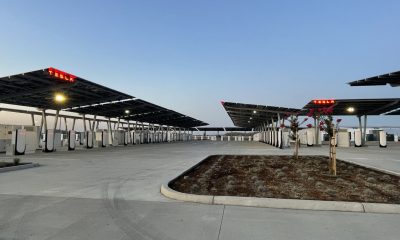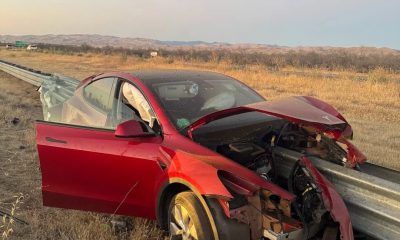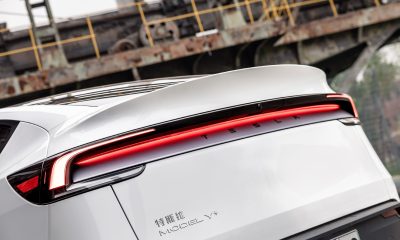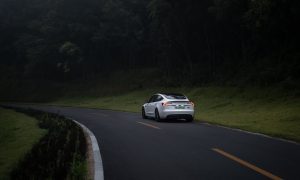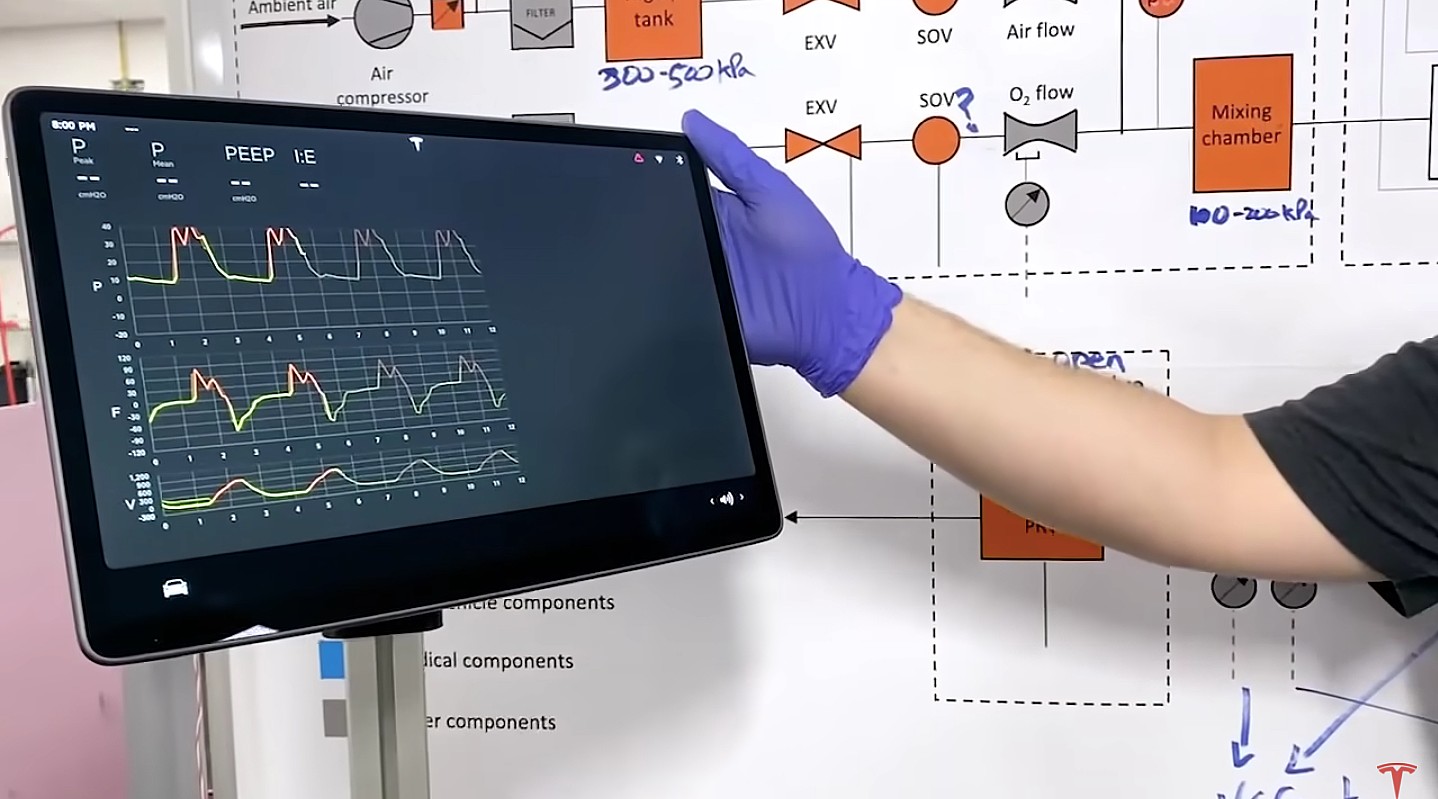

News
Tesla’s ventilator donations are being used to provoke Elon Musk into another controversy
During a global pandemic, an optimist would hope that people would work together to help those in need out of the common good. A pessimist would suggest that such circumstances would bring out the worst in people instead. Recent developments in the media coverage of Elon Musk and Tesla’s ventilator donations suggest that the pessimist is right. At times like these, there are entities who choose to provoke people that are willing to help–all for the sake of controversy.
Elon Musk is no stranger to controversy, both self-inflicted or otherwise. Over the past years, Musk has butted heads with several entities, from regulators like the SEC to journalists who tend to cover Tesla with pervading negative slant. Some of these bouts have resulted in a lot of pain for Musk and even Tesla shareholders. An example of this is Musk’s spat with British caver Vern Unsworth, whose defamation case against the CEO over comments following the Thailand cave rescue triggered some TSLA stock swings and extensive coverage from multiple premier news outlets.
Musk has a strong tendency to correct misleading reports. Take CNN’s recent coverage of Tesla’s ventilator donations, for example. The news outlet published a report alleging that no ventilators have reached CA hospitals despite Musk’s commitment to do so. Musk then took it upon himself to correct the report, showing messages between Tesla and the medical professionals from the state communicating about the donated machines and their use.
This, of course, triggered even more staff from CNN to double down, alleging that the non-invasive ventilators donated by Tesla weren’t ventilators at all, despite medical professionals stating that the machines are invaluable for non-critical coronavirus cases. The BiBAPs and CPAPs donated by Tesla could even be retrofitted using a simple modification to work for critical cases. Tesla has also started delivering actual invasive ventilators to hospitals, on top of the company’s efforts to develop its own ventilator using Model 3 parts.
Anyone with an iota of sense would see that Tesla and Musk are pretty much doing what they can to address the needs of medical professionals as much as possible. Are the BiBAPs and CPAP’s donated by Musk useful in the battle against the coronavirus? Medical professionals, government officials, and CEOs of actual ventilator makers would agree. Can the machines be modified to work for more severe cases? The doctors at Mt. Sinai Hospital in New York say it’s actually pretty simple to do so. With this in mind, it seems like a no-brainer to conclude that the machines Tesla donated are indeed helping in the battle against the ongoing pandemic.
This point was lost entirely in critical articles that have been published about Musk and Tesla’s donations from outlets such as CNN. One who is unfamiliar with the events that led up to Musk’s recent Twitter interactions would likely think that the Tesla CEO brazenly lied when he committed to donating free ventilators, instead giving away cheap machines that are useless against the C-19 virus. Critics would even refuse to acknowledge non-invasive machines as actual ventilators, despite authorities such as John Hopkins listing them as such.
A key thesis against Musk alleges that he lied about ventilator donations to get some free PR and goodwill. This does not hold water, as Tesla and Musk already receive an insane amount of media coverage, and the company is scrutinized consistently by the media and critics from Wall Street. Thus, the idea of Musk wanting more media coverage to stroke his ego does not seem to make sense, considering that he and his companies actually get a little bit too much coverage. With this in mind, it appears that CNN’s recent reports about Tesla’s ventilator donations, as well as the succeeding tweets from the media outlet’s staff doubling down on their narrative, are designed to do one thing. They are posted to provoke Musk, until such a time when he actually responds with something concretely controversial.
Something similar has happened before. Mention Musk’s name with the Thai cave rescue and many will likely remember the CEO’s incendiary comments against British caver Vern Unsworth. A popular narrative for the event also alleges that Musk stuck his nose into the rescue without prompting so he can get free PR, and that he “attacked” the caver just because he wanted to. The fact that Musk was invited to help, that his team was in close communication with rescuers, and that the caver initiated the verbal spat, are largely forgotten. These experiences, as painful as they may be, must now stand as a huge lesson to Elon Musk.
Musk is no stranger to controversies with the media, and having gone through significant pains over the years because of them, he must handle the ongoing attempts to provoke him with extreme caution. At this point, Musk’s critics (and apparently, CNN staff) are practically salivating at the prospect of the CEO firing off a tweet that can be interpreted as a direct act of aggression against the news outlet or any of its staff. So far, Musk’s responses have been sarcastic, and that’s fine and true to his personality. But the Tesla CEO must be aware that he is not playing a fair game here. Every point of syntax and semantics can and will be exploited to fit a narrative, even if it means twisting the context of a statement. With this in mind, Musk’s best strategy for now is to proceed with a ton of caution, or complete silence.
News
Tesla opens massive solar Supercharger station in California
The Supercharger opened to customers ahead of Fourth of July weekend, while Tesla continues phase two of construction on the site.
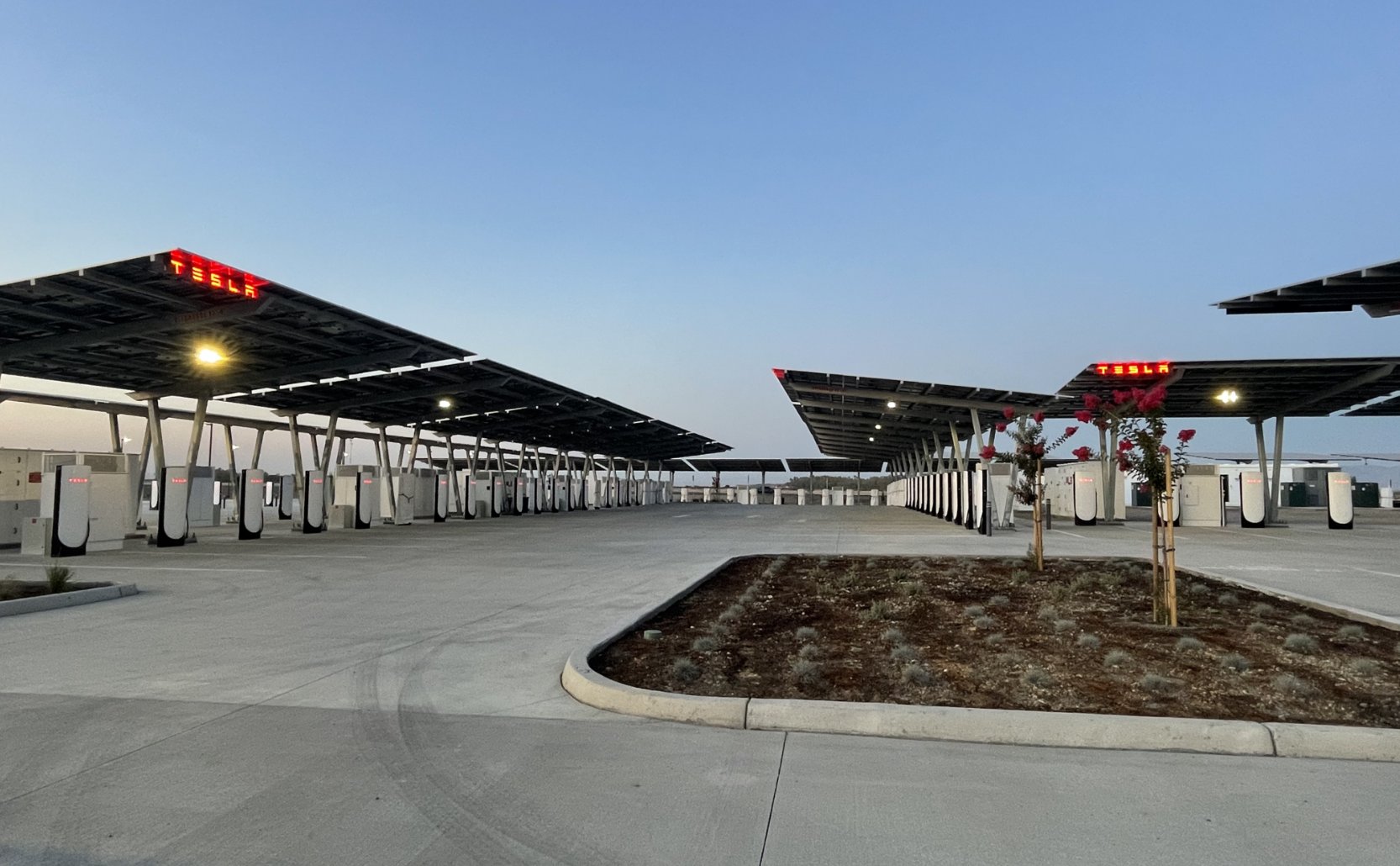
Tesla has officially launched the first several Supercharging posts at a massive station in California, notably including solar canopies and grid-scale batteries to offer completely renewable charging.
Last week, Tesla announced on X that it opened the first 84 Supercharger stalls of a planned 168-stall station in Lost Hills, California. Additionally, the massive Supercharger project features 11MW of solar canopies and 10 Megapack batteries for off-grid charging powered entirely by solar energy.
Tesla completed the first phase of the project just days ahead of the busy Fourth of July holiday weekend, adding that initial construction took just eight months. In addition to the remaining charging stalls, Tesla says it’s building a set of lounge areas, renderings of which can be seen below alongside current photos of the site.
Notably, the site also includes V4 charging posts for the company’s latest available charging speeds, and it’s located near the busy junction between I-5 and Highway 46 in Kern County.
“Thank you [Kern County] and [PG&E] for collaboration and approvals,” Tesla wrote in a follow-up post.
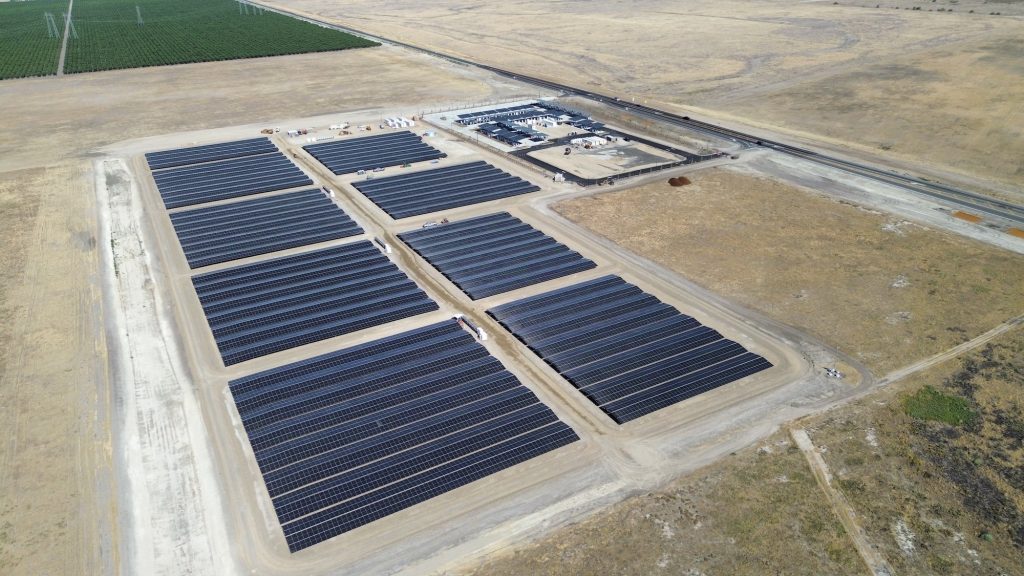
Credit: Tesla Charging | X
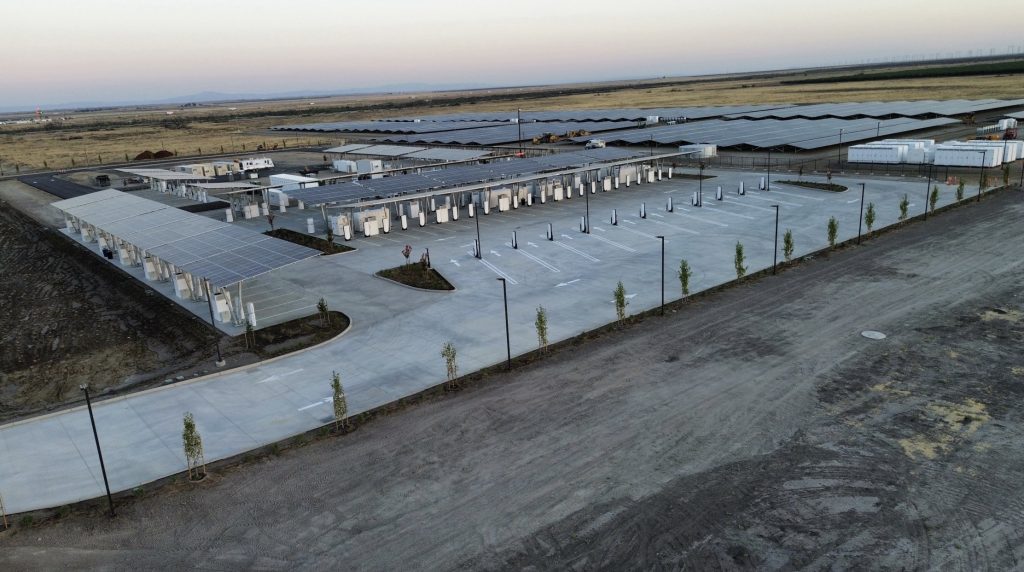
Credit: Tesla Charging | X
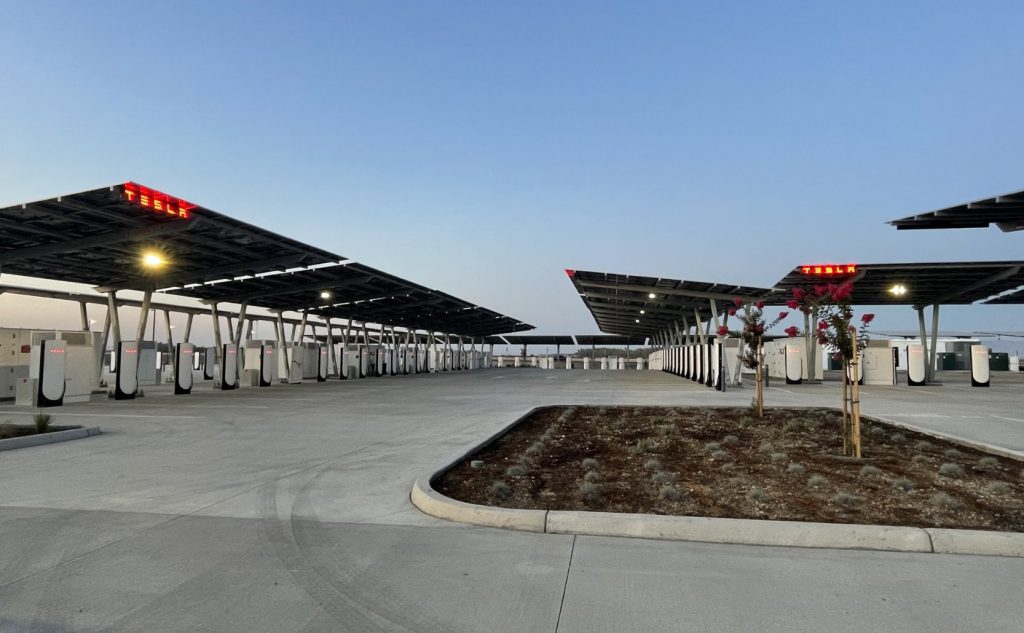
Credit: Tesla Charging | X
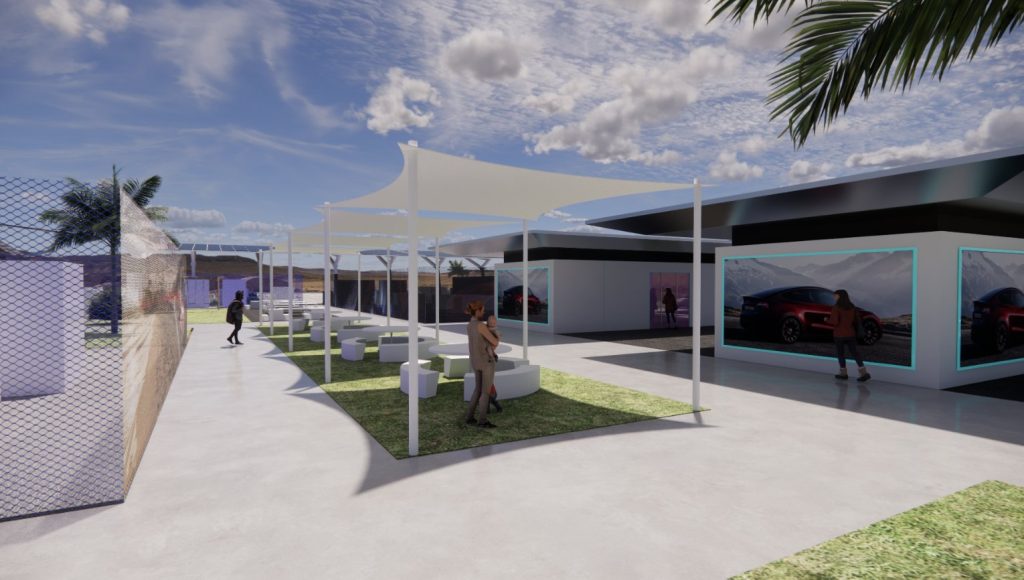
Credit: Tesla Charging | X
Tesla Supercharger Maps for North America, Europe, and Asia pic.twitter.com/0U5r0XRPyo
— TESLARATI (@Teslarati) July 2, 2025
READ MORE ON TESLA SUPERCHARGERS: Tesla launches ultra-fast V4 Superchargers in China for the first time
Testing at the LA Diner, plus Musk update on potential Tesla solar Gigafactory
The huge Tesla Supercharger station completed phase one of construction fairly quickly, especially given how long Tesla has been working on its unique Los Angeles diner, drive-in, and Supercharger location. Still, the company was seen performing some testing at the nearly-completed charging station earlier this month, and will reportedly be holding a job fair.
Elon Musk also responded on Monday morning to a post on X, suggesting that Tesla is “thinking about” building a U.S.-based solar Gigafactory in order to help support increased power needs with AI growth, and to bolster domestic solar production.
Tesla is building a new UFO-inspired Supercharger in the heart of Alien country
News
Tesla driver walks away from major accident with minor injuries
The driver sustained only minor injuries, and the exact cause of the crash remains under investigation.
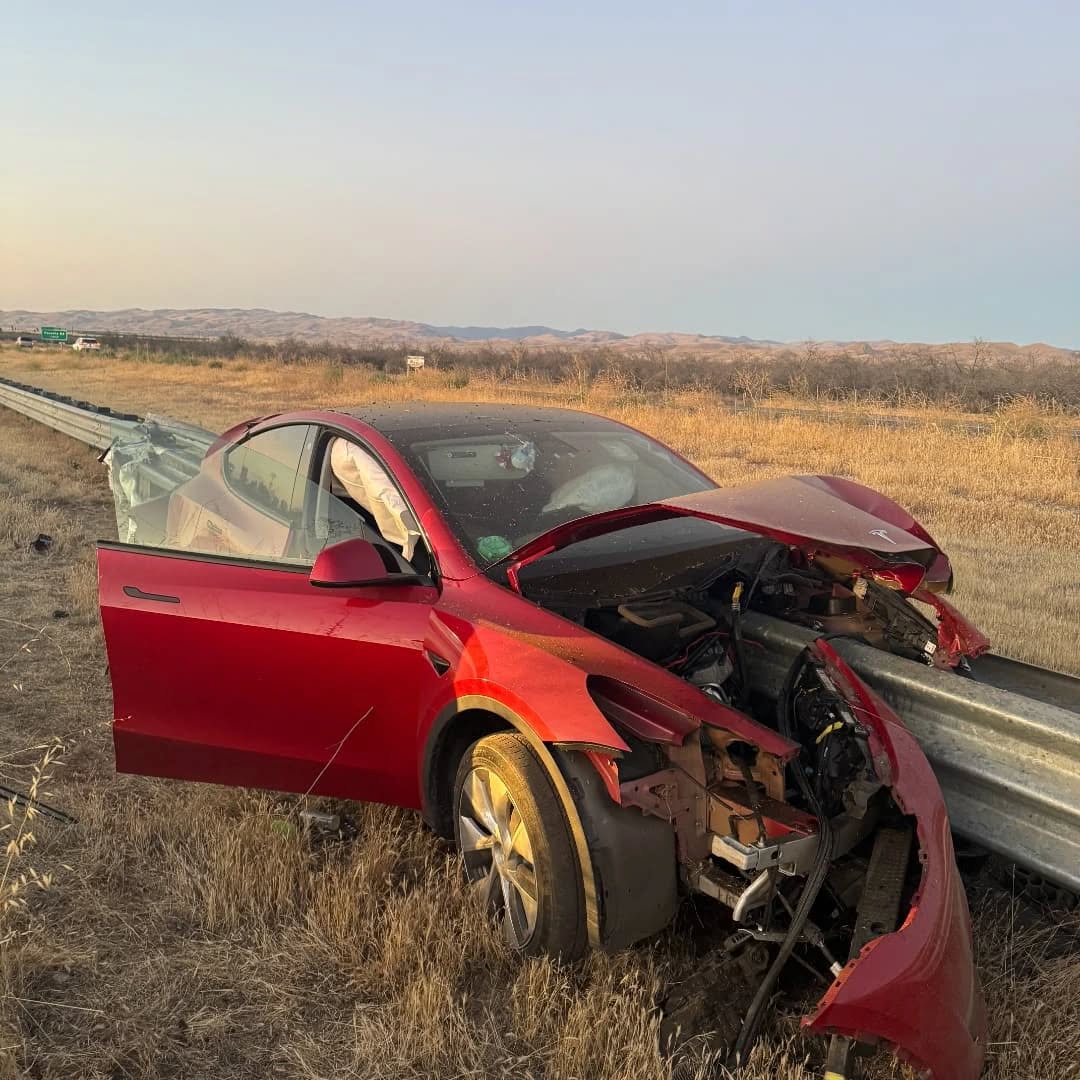
The driver of a Tesla Model Y survived and walked away from a harrowing accident on Monday in California, only sustaining minor injuries despite the vehicle being impaled by a guardrail.
On Monday morning around 4:34 a.m., the Los Banos division of the California Highway Patrol (CHP) responded to the accident on I-5 near Panoche Road, involving a 23-year-old in a Tesla Model Y. According to a post on social media, the driver veered off the road for unknown reasons in the northbound lane, before crashing directly into the guardrail and impaling the vehicle.
You can read the full message and photos from Los Banos CHP below, as were shared in a Facebook post on Monday afternoon.
This morning a Tesla model y was traveling in the #1 northbound lane of I-5 north of Panoche Rd. For unknown reasons driver allowed V-1 to veer off the roadway, travel through a dirt center divide, and crashed into the fixed metal guardrail. Lucky for the driver he only sustained minor injuries and was able to walk away. Driving a vehicle requires 100% attention to the road. Avoid distractions and focus on driving.
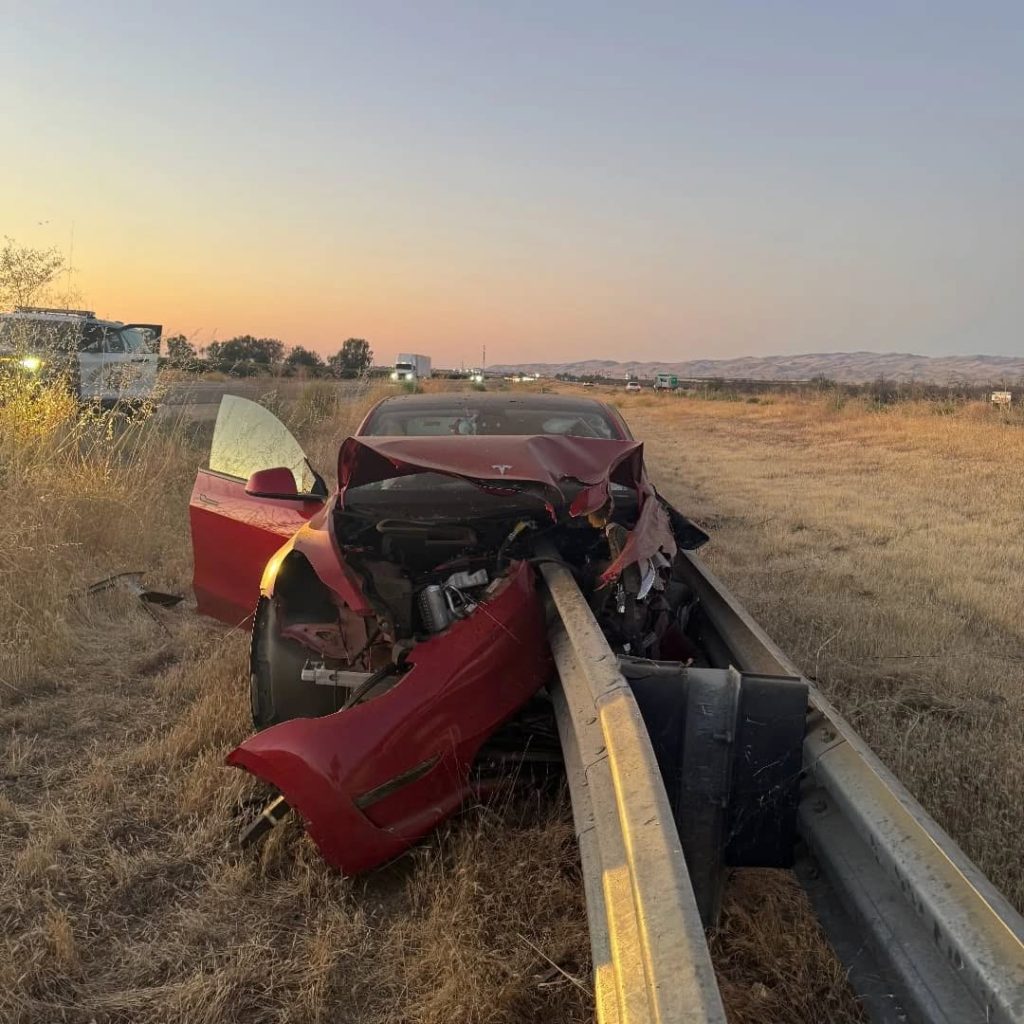
Credit: CHP Los Banos (via Facebook)
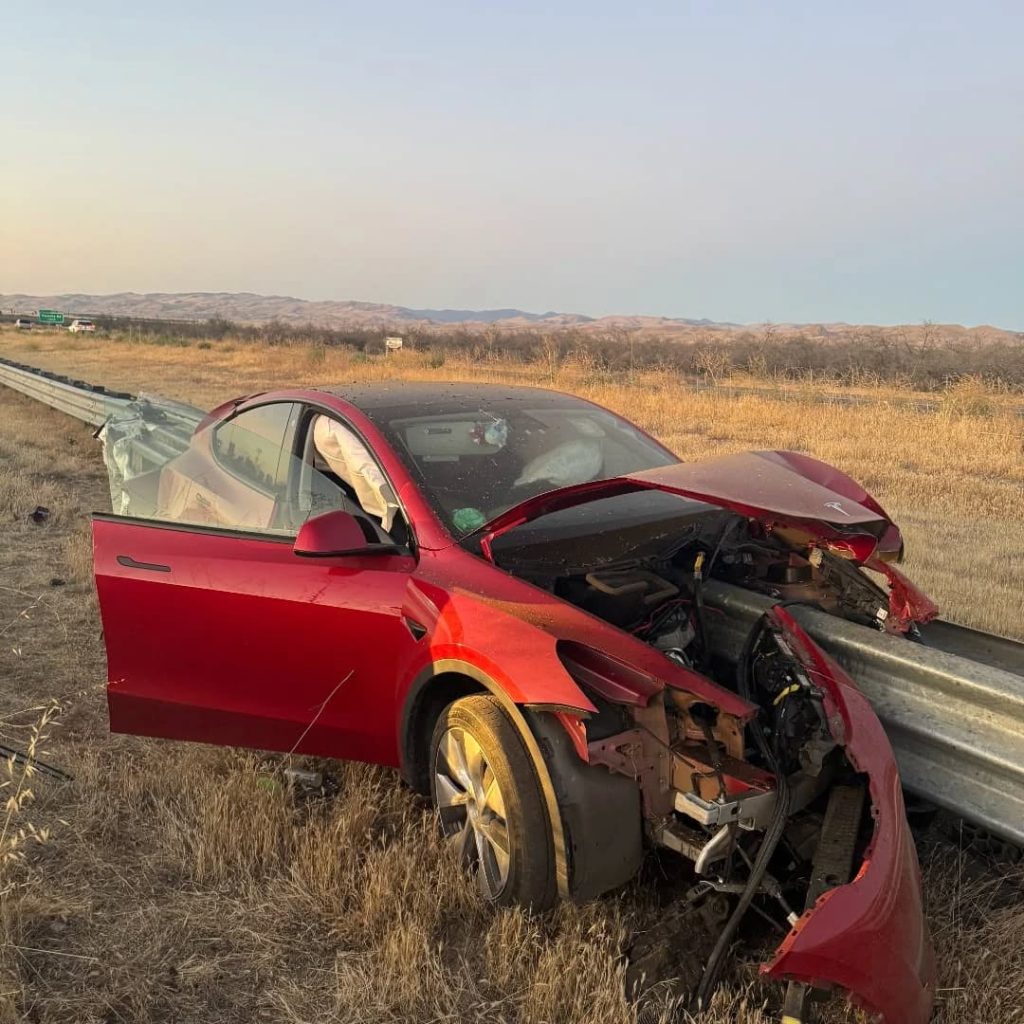
Credit: CHP Los Banos (via Facebook)
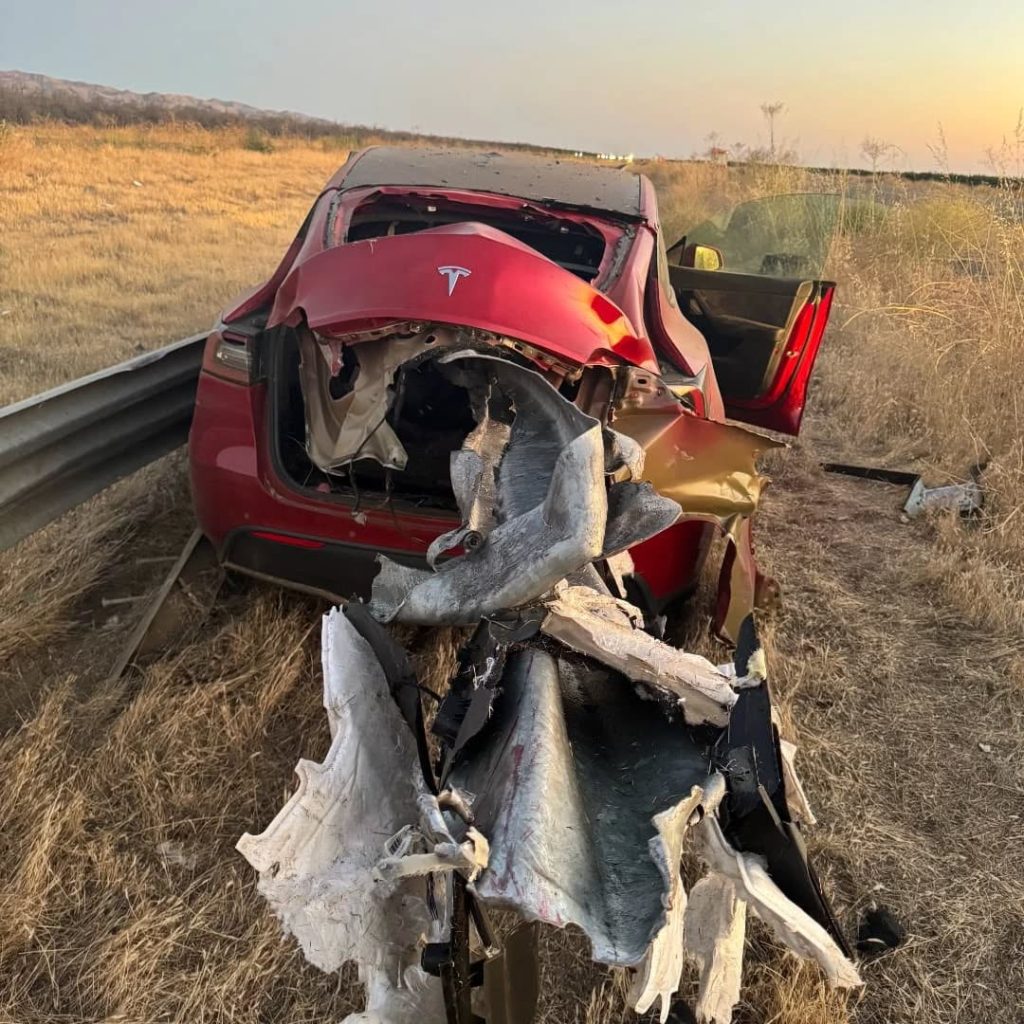
Credit: CHP Los Banos (via Facebook)
In a statement to SFGate, CHP officer Myles Anderson said that the driver only sustained minor injuries, while no arrests are made and drugs and alcohol are not suspected to have been involved. The report also notes that Tesla’s “cruise control and lane assistance features” were activated, according to Anderson. However, it’s not entirely clear if this is referring to Supervised Full Self-Driving (FSD), or to the cruise control and lane assist features baked into Autopilot.
At the time of writing, CHP has not yet responded to Teslarati’s request for clarification and additional details on the matter.
Tesla Crash Safety Ratings across its lineup: pic.twitter.com/ny30R7ceji
— TESLARATI (@Teslarati) July 1, 2025
READ MORE ON TESLA SAFETY: Tesla rolls out crucial new safety feature aimed at saving children
The news comes after Tesla has touted its vehicles as incredibly safe for many years. In December, for example, the company highlighted receiving top safety scores from regulators on four different continents throughout the world, including from the National Highway Traffic Safety Administration (NHTSA) and the Insurance Institute of Highway Safety (IIHS) in the U.S.
Tesla has also listed the goal of making its vehicles the safest on the road throughout the years, both in the overall design of its vehicles and in its Autopilot and Full Self-Driving (FSD) programs.
Tesla Model 3 ranks as the safest new car in Europe for 2025, per Euro NCAP tests
Investor's Corner
Cantor Fitzgerald maintains Tesla (TSLA) ‘Overweight’ rating amid Q2 2025 deliveries
Cantor Fitzgerald is holding firm on its bullish stance for the electric vehicle maker.

Cantor Fitzgerald is holding firm on its bullish stance for Tesla (NASDAQ: TSLA), reiterating its “Overweight” rating and $355 price target amidst the company’s release of its Q2 2025 vehicle delivery and production report.
Tesla delivered 384,122 vehicles in Q2 2025, falling below last year’s Q2 figure of 443,956 units. Despite softer demand in some countries in Europe and ongoing controversies surrounding CEO Elon Musk, the firm maintained its view that Tesla is a long-term growth story in the EV sector.
Tesla’s Q2 results
Among the 384,122 vehicles that Tesla delivered in the second quarter, 373,728 were Model 3 and Model Y. The remaining 10,394 units were attributed to the Model S, Model X, and Cybertruck. Production was largely flat year-over-year at 410,244 units.
In the energy division, Tesla deployed 9.6 GWh of energy storage in Q2, which was above last year’s 9.4 GWh. Overall, Tesla continues to hold a strong position with $95.7 billion in trailing twelve-month revenue and a 17.7% gross margin, as noted in a report from Investing.com.
Tesla’s stock is still volatile
Tesla’s market cap fell to $941 billion on Monday amid volatility that was likely caused in no small part by CEO Elon Musk’s political posts on X over the weekend. Musk has announced that he is forming the America Party to serve as a third option for voters in the United States, a decision that has earned the ire of U.S. President Donald Trump.
Despite Musk’s controversial nature, some analysts remain bullish on TSLA stock. Apart from Cantor Fitzgerald, Canaccord Genuity also reiterated its “Buy” rating on Tesla shares, with the firm highlighting the company’s positive Q2 vehicle deliveries, which exceeded its expectations by 24,000 units. Cannacord also noted that Tesla remains strong in several markets despite its year-over-year decline in deliveries.
-

 Elon Musk1 week ago
Elon Musk1 week agoTesla investors will be shocked by Jim Cramer’s latest assessment
-

 News2 weeks ago
News2 weeks agoTesla Robotaxi’s biggest challenge seems to be this one thing
-

 News2 weeks ago
News2 weeks agoWatch the first true Tesla Robotaxi intervention by safety monitor
-

 Elon Musk1 week ago
Elon Musk1 week agoA Tesla just delivered itself to a customer autonomously, Elon Musk confirms
-

 News2 weeks ago
News2 weeks agoTesla Robotaxi rollout proves that Elon Musk still delivers, even if it’s late
-

 Elon Musk2 weeks ago
Elon Musk2 weeks agoElon Musk confirms Tesla Optimus V3 already uses Grok voice AI
-

 Elon Musk2 weeks ago
Elon Musk2 weeks agoxAI welcomes Memphis pollution results, environmental groups push back
-
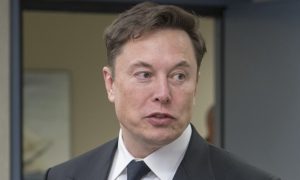
 Elon Musk2 weeks ago
Elon Musk2 weeks agoElon Musk commends Tesla team on successful Robotaxi launch


